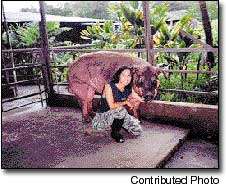LIHU’E — Members of the Kaua’i County Council Thursday presented a certificate to Valerie “Val” Kaneshiro of ‘Oma’o, recognizing her for being chosen president of the Hawaii Pork Industry Association and named to the Pork Leadership Academy.
As state association president, she is spokesperson for the industry in Hawai’i, representing 60 pig farmers big and small on Kaua’i and hundreds of others across the state.
Kaneshiro, of M&H Kaneshiro Farm in ‘Oma’o and Kalaheo, helps her family run the island’s only pig slaughter house.
Councilwoman JoAnn A. Yukimura praised Kaneshiro for having been elected as president of the state pork association and being able to help operate a family-owned pig business in ‘Oma’o.
Beaming with pride, councilman Daryl Kaneshiro, who is related to Kaneshiro, said her family has been involved with running the family business for four generations.
Councilman Jay Furfaro complimented members of the Hawaii Pork Industry Association for producing literature and leaflets to promote the industry, and thanked Valerie Kaneshiro for her leadership.
Kaneshiro, her husband, Dervin, and their son, Ahren, operate a farrowing-to-finish pig farm in ‘Oma’o, and the island’s only pork slaughter house in Kalaheo.
The Kaneshiro clan began raising pigs in the early 1900s, and the brothers of Mamo Kaneshiro, Valerie Kaneshiro’s father-in-law, officially started the pig business in the 1950s.
Mamo and Joen Kaneshiro, Valerie Kaneshiro’s mother-in-law, expanded the business in the 1970s.
More than 60 percent of the pork in Hawai’i is produced on O’ahu. The Kaneshiro business is among the most well known pig enterprises on Kaua’i, and currently boasts 200 sows.
The company delivers wholesale pork to stores, hotels and individuals, Kaneshiro said.
She said the number of pig farms on Kaua’i has dropped from 80 to 60 in recent years, due to urbanization.
But Kaneshiro said she and association members will be working with the Natural Resources Conservation Service in Hawai’i to amend government regulations to reduce the cost of running pig farms, hopefully leading to more people getting into pig farming, Kaneshiro said.
“They can provide cost-share money to help us control odor and provide useful byproducts such as fertilizers and soil amendments,” Kaneshiro said.
Kaneshiro reiterated what councilman Kaneshiro said at a public meeting in Lihu’e recently, that even with the recent mad-cow scare in the United States, Kaua’i’s own beef is safe to eat because the cattle is grown locally and is fed grass.
Bovine spongiform encephalopathy, more commonly mad-cow disease, is a fatal, neurodegenerative disease of cattle that can be transmitted to humans.
Kaneshiro said mad-cow disease is not a concern to those in the pig industry. “It (mad-cow disease) is transmitted to cows, by one cow eating the infected nervous tissue of another cow,” she said. “It can’t be transmitted to pigs.”
Kaneshiro also is one of 22 U.S. pork producers taking part in a new program to help groups support and train representatives from the pork industry.
As a Pork Leadership Academy participant, Kaneshiro attends meetings to promote the pork industry and researches efforts to strengthen the industry.
Kaneshiro will speak up for agriculture, talk to people or groups not directly connected to the agriculture industry, and work on committees to promote the industry.
Staff Writer Lester Chang may be reached at 245-3681 (ext. 225) or mailto:lchang@pulitzer.net.



